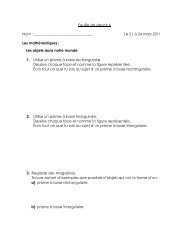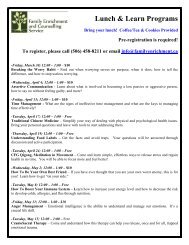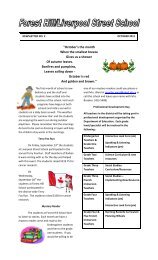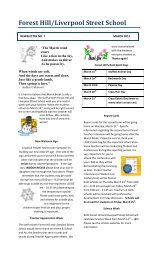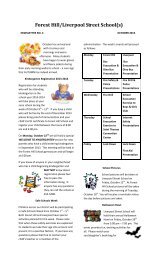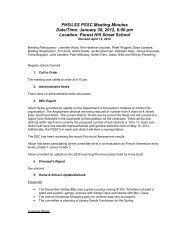We are beginning a writing unit on memoirs attached is some info.
We are beginning a writing unit on memoirs attached is some info.
We are beginning a writing unit on memoirs attached is some info.
- No tags were found...
Create successful ePaper yourself
Turn your PDF publications into a flip-book with our unique Google optimized e-Paper software.
Genre Study: Teaching Memoir Writingby D<strong>on</strong>na Bakerhttp://www.webpages4teachers.com/thewriteresourceSteps to Planning & Implementing Your Memoir Study:ÿº Writing pre-assessment - determine your students needsÿº Compile your resources and plan the less<strong>on</strong>s you would like to teach. Make sure that your less<strong>on</strong>saddress a variety of <str<strong>on</strong>g>writing</str<strong>on</strong>g> strategies (e.g. 6 + 1 Traits)ÿº Prior to asking students to write <strong>memoirs</strong>, immerse them in Memoir texts to determine character<strong>is</strong>tics ofthe genre.ÿº Have students generate many ideas and many drafts in the first few weeks of study.ÿº Teach mini-less<strong>on</strong>s and have students apply skills and strategies to their drafts.ÿº Use the <str<strong>on</strong>g>writing</str<strong>on</strong>g> process to encourage students to rev<strong>is</strong>e their drafts using tips f rom mini-less<strong>on</strong>sÿº Ask students to choose their best from the drafts they have written. They will then rev<strong>is</strong>e & edit thedraft before producing their good copy.SAMPLE MEMOIR STUDY<str<strong>on</strong>g>We</str<strong>on</strong>g>ek One/Two: Immersi<strong>on</strong> in Memoir Texts: Students determine character<strong>is</strong>tics of the genre:ÿüA memory; a descripti<strong>on</strong> of an event from the pastÿüWritten in the first pers<strong>on</strong>; told from <strong>on</strong>e pers<strong>on</strong>s point of viewÿüBased <strong>on</strong> the truthÿüReveals the feelings of the writerÿüHas meaning; shows what the author learned from the experienceÿüFocused <strong>on</strong> <strong>on</strong>e event; about <strong>on</strong>e point in the authors lifeÿüAbout the authors experience more than about the event itselfFrom: Lattimer, Heather. Thinking Through Genre: Units of study in Reading and Writing Workshops 4 -12,Stenhouse Publ<strong>is</strong>hers, 2003.Author Studies Patricia Polacco, Eve BuntingNovels/Short Story Collecti<strong>on</strong>s: C<strong>is</strong>neros, Sandra. The House <strong>on</strong> Mango StreetEhrlich, Amy. When I Was Your AgeFletcher, Ralph. Fig PuddingMiniless<strong>on</strong>sSkill Focus Generating Ideas & Topicsÿº Whats A Good Idea: Something you know a lot about(SP)Writing Bingo (WG p.63)ÿº WAGI: Something you can describe in great detailPers<strong>on</strong>al Surveyÿº WAGI: Something you have str<strong>on</strong>g feelings aboutTopic T-Chart: Best/Worst Life Eventsÿº Turn & Talk sharing ideas with groups & partnerReaders Workshop C<strong>on</strong>necti<strong>on</strong>My Mama Had a Dancing Heart- LibbaMoore GrayThe Relatives Came - Cynthia RylantTar Beach Faith RinggoldMy Maple Leaf Sweater Mike Le<strong>on</strong>ettiOwl Mo<strong>on</strong> Jane YolenAlexander and the Horrible, No Good, VeryBad Day- Judith Viorst
Skill Focus - Organizati<strong>on</strong>ÿº Pers<strong>on</strong>al Memoir Organizer (WG p.53)ÿº Organizing <str<strong>on</strong>g>writing</str<strong>on</strong>g> using timeÿº Using transiti<strong>on</strong> words (A Day to Remember)ÿº Bold Beginnings (MWWLE p. 40)ÿº Extended Story Endings (MWWLE p. 89-90)Skill Focus Voiceÿº Voice Descriptors- Comp<str<strong>on</strong>g>are</str<strong>on</strong>g> 2 Versi<strong>on</strong>s (Fly Away Home)ÿº Voice Points of View (PBTW p. 60)ÿº Adding Voice (10 WL p. 39-43)Skill Focus Ideas - C<strong>on</strong>tentÿº What Counts in Ideas and C<strong>on</strong>tentÿº Zoom In <strong>on</strong> a Pers<strong>on</strong>al Moment (WA p. 31-32)ÿº Sharpening the Focus (10 WL p 12-17)ÿº Adding Details (10WL p. 31-38; SP)ÿº Show D<strong>on</strong>t Tell (WLFTO p. 52-59)Skill Focus Word Choiceÿº Use vivid and powerful words Sparkling Wordsÿº Vivid Verbs The Trait Crate Grade 3ÿº Comp<str<strong>on</strong>g>are</str<strong>on</strong>g> Two Versi<strong>on</strong>s Poetry (WLFTO- p20)Skill Focus Sentence Fluencyÿº Create Student Charts: Super Sentence Writersÿº Use vivid and powerful words Sparkling Wordsÿº SSW - Use appropriate poetic devices: Simile & Metaphorÿº SSW - Use appropriate poetic devices: Onomatopoeiaÿº SSW - Use a variety of sentence lengths: Counting Wordsin Sentencesÿº Improving Sentence Fluency (10 WL p.54-60)Skill Focus C<strong>on</strong>venti<strong>on</strong>s & Presentati<strong>on</strong>ÿº Strategies to try when you d<strong>on</strong>t know how to spell aword:squiggle under word, Have-A-Go padÿº Punctuating Dialogueÿº COPSComplete organizer for books read in Wk 1Alexander and the Horrible, No Good, VeryBad Day- Judith ViorstMy Mama had a Dancing HeartFly Away Home Eve BuntingS<strong>is</strong>ter Annes Hands Marybeth LorbieckiThe Memory String - Eve BuntingThe Butterfly - Patricia PolaccoMy Mama had a Dancing HeartGrandpas Face - Elo<strong>is</strong>e GreenfieldThunder Cake - Patricia PolaccoOwl Mo<strong>on</strong> - Jane YolenThundercake- Patricia PolaccoFreedom Summer Deborah WilesHey You! Cmere Elizabeth SwadosRag Coat - Lauren MillsFireflies Julie BrinckloeSee my website for less<strong>on</strong> ideasResource Key:10 WL Schaefer, Lola M. Ten Writing Less<strong>on</strong>s for the Overhead Grades 3-6.Scholastic, 2002.WLFTO Schaefer, Lola M. Writing Less<strong>on</strong>s for the Overhead: Grades 5 & Up. Scholastic, 2003.MWWLE Maric<strong>on</strong>da, Barbara. The Most W<strong>on</strong>derful Writing Less<strong>on</strong>s Ever.Scholastic, 1999.WG Rog, Lori Jam<strong>is</strong><strong>on</strong>. Kropp, P. Write Genre. Pembroke Publ<strong>is</strong>hers Ltd. 2004.PBTW - Culham, Ruth. Using Picture Books to Teach Writing with the Traits, Scholastic, 2004.SP Peha, Steve. website: www.ttms.org (a must see he has great resources for <str<strong>on</strong>g>writing</str<strong>on</strong>g>)
Character<strong>is</strong>tics of MemoirsA memory; a descripti<strong>on</strong> of an eventfrom the pastWrit ten in the first pers<strong>on</strong>; toldfrom <strong>on</strong>e pers<strong>on</strong>’s point of viewBased <strong>on</strong> the truthReveals the feelings of the writerHas meaning; shows what theauthor learned from the experienceFocused <strong>on</strong> <strong>on</strong>e event; about <strong>on</strong>epoint in the author’s lifeAbout the author’s experience morethan about the event itselffrom: Lattimer, Heather. Thinking Through Genre: Units of study in Reading and WritingWorkshops 4-12, Stenhouse Publ<strong>is</strong>hers, 2003, p.45
What’s a Good Idea?Something you haveabout.STRONG FEELINGSSomething youKNOW A LOTabout.Something you canDETAIL.DESCRIBE IN GREATSomething yourINTERESTED in.AUDIENCEwill beSomething your AUDIENCEwas WORTH READING.will feelfrom: Steve Peha, Teaching That Makes Sense, www.ttms.org
What Counts in Ideas & C<strong>on</strong>tent?The story <strong>is</strong> clear and focused.Ideas <str<strong>on</strong>g>are</str<strong>on</strong>g> fresh and original.The writer stays <strong>on</strong> topic, and it <strong>is</strong> easy to tell what the main idea <strong>is</strong>.It hold's the reader's attenti<strong>on</strong>. Once you start reading the story,you d<strong>on</strong>'t want to stop.Level OneLevel TwoLevel ThreeLevel FourR It <strong>is</strong> hard to find my main idea.R I do not focus <strong>on</strong> <strong>on</strong>e incident.R My paper <strong>is</strong> not interesting, it <strong>is</strong> simple.I have few or no details.R My main idea <strong>is</strong> there but not developed clearly.R Some of my memoir <strong>is</strong> focused <strong>on</strong> <strong>on</strong>e incident.R My paper <strong>is</strong> not very interesting and verypredictable.R I often use details that <str<strong>on</strong>g>are</str<strong>on</strong>g> repeated and may notfit with main idea.R My main idea <strong>is</strong> clearR Most of my memoir <strong>is</strong> focused <strong>on</strong> <strong>on</strong>e incident.R My paper <strong>is</strong> fairly interesting, I use <strong>some</strong> originalideas, but more predictable ideas.R I use supporting details that usually fit with themain idea.R My main idea <strong>is</strong> very clear.R I always stay <strong>on</strong> topic.R My paper <strong>is</strong> interesting, fresh and original.R My supporting details fit with the main idea.Teaching Note: Choose a well written piece (see “Wasn’t That Fun?” or a good picture book (e.g.My Mama Had a Dancing Heart by Libba Moore Gray) and ask students to rate itusing the criteria and rubric.
PERSONAL SURVEYPlaces I have beenThings I can doGames I know how to playMy favourite thingsInteresting people I knowfrom: Freeman, Marcia S. Building a Writing Comm<str<strong>on</strong>g>unit</str<strong>on</strong>g>y: A practical guide.Gainesville, Fla.: Maupin House. 1999. p. 47.
ZOOM IN!<strong>on</strong>e moment in timetell the outside story - what washappeningtell the inside story - what youwere thinking and feelinguse dialogue to add impacttell details <strong>on</strong>ly the writer knowsfrom: <str<strong>on</strong>g>We</str<strong>on</strong>g>lls, J.; Reid, J. Writing Anchors. Pembroke Publ<strong>is</strong>hers, 2004, p. 31
Wasn’t That Fun?I couldn’t believe it! I was actually going to do it! I waslining up for the Cork Screw. I was wide eyed, staring atthe gigantic ride. High above me was endless hoops, turns,jerks, hills, loops and twirls. My heart, I could feelpounding. “I chose to go <strong>on</strong> th<strong>is</strong>, but why?” I asked myself.So I could get out of th<strong>is</strong> terrible situati<strong>on</strong>, I closed myeyes.In my head, I could imagine myself taking stepstoward home. Suddenly, Alex yelled, “Good luck!” I wastwo people away from my worst nightm<str<strong>on</strong>g>are</str<strong>on</strong>g>. Twopassengers then I could be <strong>on</strong> board. I’d been chatteringmy teeth now for the past 20 minutes. They hurt, so didmy knees. They had been knocking together since the lasttime I checked my watch.Some<strong>on</strong>e pushed my back. I looked back but no <strong>on</strong>ewas there. “Oh well” I thought aloud. While I was thinkingabout who pushed me <strong>some</strong><strong>on</strong>e latched me up! I lookedaround. I was trapped in the bars! I tried to escape thehuge ride by closing my eyes. I was bumping up and downvery slowly. <str<strong>on</strong>g>We</str<strong>on</strong>g> were going up the hill bump. Bump. Bump. Ilooked up for a moment at the sky to w<strong>is</strong>h that I wouldhave a safe journey. I said to myself It can’t be that
aaaddddd HELP ME!!!! I was taking the l<strong>on</strong>g journeydown.Then we started the endless curves and bumps. <str<strong>on</strong>g>We</str<strong>on</strong>g>went straight. Then to the left! Then to the right! Thenup. Then down. And to the right, Then left!Oh no! <str<strong>on</strong>g>We</str<strong>on</strong>g> were coming up to the. . . Upside down,screaming, yelling, gasping for air loop da loop. Upsidedown! Twice! Straight, straight, straight, loop, loop aroundand around again. My head was spinning – and fast. Again upwe went suddenly! I held <strong>on</strong>to my head thinking it mightcome off. I couldn’t take it anymore! Then we slowly wentdown the hill. Straight. Straight.I could see people waiting in line. It slides. Then halts.It’s over. I quietly sigh with relief. Terror loosened itsgrip from my shoulders from every<strong>on</strong>e begging me to go <strong>on</strong>.I had d<strong>on</strong>e it. I was a survivor. I got off the ride stillsc<str<strong>on</strong>g>are</str<strong>on</strong>g>d, but proud. Then Alex, Jenny and Zarhra came upto me and hollered, “Wasn’t that fun?”by Tracy- Grade 4from: <str<strong>on</strong>g>We</str<strong>on</strong>g>lls, J. Writing Anchors. p. 32Teaching Note: Use th<strong>is</strong> <str<strong>on</strong>g>writing</str<strong>on</strong>g> piece as an exemplar which shows a writer who “Zoomed In”Ask students to identify the parts which followed the Zoom In criteria.
A Day to Remember (not)!It seemed like an ordinary day when I got upyesterday morning, but I was about to embark <strong>on</strong> theworst day of my life. First, I fell in the bathtubbecause my mother neglected to rinse out her bath oil.Then I spilled orange juice <strong>on</strong> the outfit that I spenthours putting together for school pictures. While Iwas changing, I messed up the beautiful French braidmom put in my hair. As I walked out the door, Idropped all of my school books and my math homeworkflew away. I’m sure my teacher will believe that!Finally I made it to the car and I thoughteverything would be all right. Wr<strong>on</strong>g! My father wasn’tlooking before he backed out of the driveway and ranright into the neighbor’s truck. Of course, my side ofthe car was damaged the most, and I ended up with abroken arm. That night I went to bed early, before anyother horrible things could happen.Teaching Note: Use th<strong>is</strong> sample to have students identify the transiti<strong>on</strong>s words used in the piece.
Bold Beginnings - MemoirOne sunny day I went to the beach and saw amermaid.ACTIONI dove into the ocean, kicked my feet in the cool water, stoodup, and wiped the water from my face. I paused. Somethingstrange near the rocks caught my eye.DIALOGUE“What a great day for the beach!” I yelled as I splashedin the waves.A THOUGHT, A QUESTION, OR FEELING(If you were at the beach, what might you be thinking or feeling?)If <strong>on</strong>ly I could swim out to that sandbar, I thought. There’s<strong>some</strong>thing very strange out there. Something I’ve neverseen here at the beach before.A SOUND EFFECT(What sounds might you hear at the beach?)Kersplash! The waves crashed over me as I stood staringat the strange sight out <strong>on</strong> the jet ty.From: Maric<strong>on</strong>da, Barbara, The Most W<strong>on</strong>derful Writing Less<strong>on</strong>s Ever, 1999, p. 40-41
Bold Beginnings - MemoirACTIONDIALOGUEA THOUGHT, A QUESTION, OR FEELING(What might you be thinking or feeling?)A SOUND EFFECT(What sounds might you hear?)From: Maric<strong>on</strong>da, Barbara, The Most W<strong>on</strong>derful Writing Less<strong>on</strong>s Ever, 1999, p. 40-41
Ingredients for anExtended Story EndingA memory of the main event.The main character’s feelings.The main character’shope/w<strong>is</strong>hes.A dec<strong>is</strong>i<strong>on</strong>/defining acti<strong>on</strong>.From: Maric<strong>on</strong>da, Barbara, The Most W<strong>on</strong>derful Writing Less<strong>on</strong>s Ever, 1999, p. 89
BEFORE:Extended Story EndingsSo that <strong>is</strong> the end of the storyabout my big baseball victory.AFTER:I’ll never forget the crack of the bat as Ihit that homerun and the way my heartpounded as the ball flew out of the park.I hope we’ll be just as lucky at our nextgame, too! You can be sure I’ll bepracticing extra hard for the play-offs nextweek!From: Maric<strong>on</strong>da, Barbara, The Most W<strong>on</strong>derful Writing Less<strong>on</strong>s Ever, 1999, p. 91
ADDING VOICEUse words from your naturalspeaking vocabulary.Make it sound like YOU.Select topics that you feelstr<strong>on</strong>gly about and know about.Make sure your feelings aboutyour topic come through.Write with your audiencein mind.Adapted from: Schaefer, Lola M. 10 Writing Less<strong>on</strong>s for the Overhead: Grades 3 - 6.Scholastic, 2002. p. 44.
“Rip in the Pants” by a fifth graderJust about a week ago my teacher had a rip in h<strong>is</strong> pants. It was reallyfunny. I didn't see it right away but <strong>some</strong><strong>on</strong>e told me then I saw it andwanted to laugh but I held it in. Then <strong>some</strong><strong>on</strong>e told him and every<strong>on</strong>estarted to laugh. Then he went home to change. The End.Possible Points of View:jjjjjjjthe studentthe principalthe teacheranother teachera student who liked the teachera student who d<strong>is</strong>liked the teacherthe pantsfrom: Culham, Ruth. Using Picture Books to Teach Writing with the Traits, Scholastic, 2004,page 60
From the Point of View of the Pants:Th<strong>is</strong> <strong>is</strong> not right. I wasn’t made to be worn by aguy th<strong>is</strong> big. Oww! Every time he does anythingbut stand still, I hurt. I’m pinched and mushedand cramped so tight I can hardly breathe. Ineed relief. What I really want <strong>is</strong> revenge. Iknow...rrrrrrrip! Ha! That’ll show him. But wait,what happens next? Maybe he’ll just throw meout and I’ll never see the light of day again.Man, oh man, if I’d <strong>on</strong>ly been a tie, then Icould’ve just choked him!from: Culham, Ruth. Using Picture Books to Teach Writing with the Traits, Scholastic, 2004,page 60
I saw a bird in the airport thatcouldn't get out. The bird flew allover the place until it was so tiredit stopped.I thought, "Why doesn't th<strong>is</strong> bird justfly out of here?"After several days, the bird sawa sliding door open and it flew out.I watched it fly away.Teaching Note: Show th<strong>is</strong> versi<strong>on</strong> to students and then read aloud the versi<strong>on</strong> from the book(see next page). Ask students to tell why they liked the books versi<strong>on</strong> better.Use the Adding Voice suggesti<strong>on</strong>s to see if the author used any of thetechniques.
Once a little brown bird got into the main terminaland couldn't get out. It fluttered in the high, hollowspaces. It threw itself at the glass, fell panting <strong>on</strong>the floor, flew to a tall, metal girder, and perchedthere, exhausted."D<strong>on</strong>'t stop trying," I told it silently. "D<strong>on</strong>'t! Youcan get out!"For days the bird flew around, dragging <strong>on</strong>e wing.And then it found the instant when a sliding doorwas open and slipped through. I watched it r<strong>is</strong>e. Itswing seemed OK."Fly, bird" I wh<strong>is</strong>pered. "Fly away home!"Though I couldn't hear it, I knew it was singing.Nothing made me as happy as that bird.Adapted from a less<strong>on</strong> by Janet Dubiel. Th<strong>is</strong> page <strong>is</strong> from the book: Fly Away Home byEve Bunting.
Sparkling WordsOn sultry summer days at my grandma’s farm in Michigan, the air getsdamp and heavy. Stormclouds drift low over the fields. Birds fly closeto the ground. The clouds glow for an instant with a sharp, crackling light,and then a roaring, low, tumbling sound of thunder makes the windowsshudder in their panes. The sound used to sc<str<strong>on</strong>g>are</str<strong>on</strong>g> me when I was lit tle.I loved to go to Grandma’s house, but I fe<str<strong>on</strong>g>are</str<strong>on</strong>g>d Michigan’s summer storms.I fe<str<strong>on</strong>g>are</str<strong>on</strong>g>d the sound of thunder more than anything.
SPARKLINGWORDS/PHRASES FROM THUNDERCAKEby Patricia Polacco˜ sultry summer days˜ clouds glow˜ window panes shudder˜ drew a deep breath˜ stammered (said)˜ surveyed (looked, watched, andanalyze)˜ strode (walked)˜ crowed (said)˜ fingered (turned the pages)˜ penned (wrote)˜ scurried (walk quickly)˜ lightning flashed˜ lightning slit the sky˜ jagged edge of lightning˜ crept (walked slow andc<str<strong>on</strong>g>are</str<strong>on</strong>g>fully)˜ thunder bellowed˜ luscious (very delicious)˜ rumbled closerOnomatopoeiaCRASHBOOMBAROOOOOOMKA-BOOMCRACKLE CRACKLEBBBBAAAARRRROOOOOOMMMMMBOOOOMMMM KA-BOOOMKA-BANGZIP
I went for a walk to the beach.I was walking al<strong>on</strong>g when I got alook at a seabird eating a f<strong>is</strong>h. Iwent for a closer look. It waseating the f<strong>is</strong>h whole!<str<strong>on</strong>g>We</str<strong>on</strong>g>nt - traveled, meandered, scurried, trotted, hurried, scuttled, rushed, darted,dashed, bustled, crept, crawled, edged, strolled, roamed, wandered, ambled,scamperedLook - peer, gaze, peek, st<str<strong>on</strong>g>are</str<strong>on</strong>g>, glance, peep, glimpseEat - nibble, crunch, gobble, wolf, munch, chomp, devour, gorge,swallow, gnaw, chew, bite, snack
Improving Word Choice - Vivid VerbsSyn<strong>on</strong>yms:Original Verb:1.2.3.Syn<strong>on</strong>yms:Original Verb:1.2.3.Syn<strong>on</strong>yms:Original Verb:1.2.3.from: Culham, Ruth. The Trait Crate Grade 3: Teaching Word Choice. Scholastic, 2007
Super Sentence Writers...Use vivid and powerful words(adjectives, str<strong>on</strong>g verbs, specificnouns, adverbs)Use appropriate poetic devices(simile, <strong>on</strong>omatopoeia, metaphor,alliterati<strong>on</strong>)Use a variety of sentence lengthsUse different sentence <str<strong>on</strong>g>beginning</str<strong>on</strong>g>sUse different sentence types(statements, exclamatory,questi<strong>on</strong>s, commands)Teaching Note: Teach each of these headings as separate mini-less<strong>on</strong>s. Keep adding to yourSuper Sentence Writers Chart as you teach each less<strong>on</strong>.
Super Sentence WritersUse a variety of sentence lengths.Each day I hurried home to see my coat.It was looking like the colors of the fall days --the yellow-golds of the birch leaves, thesilvery grays and purples of the sky, the deepgreens of the pines, and the rusty reds of thechimney bricks-- all the colors Papa wouldhave chosen. I decided to put a piece ofh<strong>is</strong> work jacket in there. It just seemed right.
Sentence FluencySentence#12345678910Number of Words inEach SentenceFirst Word in EachSentence
Super Sentence WritersUse appropriate poetic devices.John Henry’s skin <strong>is</strong> the color of browned butter.He smells like pine needles after a good rain.My skin <strong>is</strong> the color of the pale moths that dancearound the porch light at night.John Henry says I smell like a just-washed sock.“Th<strong>is</strong> means war!” I shout.<str<strong>on</strong>g>We</str<strong>on</strong>g> churn that water into a white hurricane until oursides hurt.Then we float <strong>on</strong> our backs and spout like whales.Teaching Note: Use th<strong>is</strong> book to teach simile and metaphor.
Memoir RubricCriteria Level One Level Two Level Three Level FourIdeas andC<strong>on</strong>tent-Focus <strong>on</strong> <strong>on</strong>eR It <strong>is</strong> hard to findmy main idea.R I do not focus <strong>on</strong>R My main idea <strong>is</strong> there but notdeveloped clearly.R Some of my memoir <strong>is</strong> focusedR My main idea <strong>is</strong> clearR Most of my memoir <strong>is</strong>focused <strong>on</strong> <strong>on</strong>e incident.R My main idea <strong>is</strong> very clear.R I always stay <strong>on</strong> topic.R My paper <strong>is</strong> interesting andincident <strong>on</strong>e incident.<strong>on</strong> <strong>on</strong>e incident.R My paper <strong>is</strong> fairly interesting, original.-Str<strong>on</strong>g R My paper <strong>is</strong> not R My paper <strong>is</strong> not very interesting I use <strong>some</strong> original ideas, but R My supporting details fit withsupportinginteresting, it <strong>is</strong> and very predictable.more predictable ideas.the main idea.detailssimple.R I often use details that <str<strong>on</strong>g>are</str<strong>on</strong>g> R I use supporting details thatR I have few or no repeated and may not fit with main usually fit with the main idea.Organizati<strong>on</strong>-Logicalsequence-Transiti<strong>on</strong>words-Sentencesorganized intoparagraphsVoiceEffectiveUse ofLanguage-Word Choice-SentenceFluencyC<strong>on</strong>venti<strong>on</strong>s-Spelling-Punctuati<strong>on</strong>-Capitalsdetails.R I have no logicalplan or sequence.R I do not usetransiti<strong>on</strong> words.R I have not brokenmy ideas intoparagraphs.R I do not CAREabout th<strong>is</strong> topic.R My word choice <strong>is</strong>very limited, basicand <strong>some</strong>times I usewords incorrectly.R I use short, simplesentencesR I have manyspelling errors.R I have used littleor no punctuati<strong>on</strong>.R It <strong>is</strong> almostimpossible tounderstand my<str<strong>on</strong>g>writing</str<strong>on</strong>g>.R A great deal ofediting, correcting andrev<strong>is</strong>ing <strong>is</strong> needed.idea.R My plan and sequencing <str<strong>on</strong>g>are</str<strong>on</strong>g>weak. Sometimes you cannotunderstand my pieceR I try to use transiti<strong>on</strong> words, but<strong>some</strong>times they do not make senseR I have tried a few paragraphs,R It <strong>is</strong> hard to tell I CARE aboutth<strong>is</strong> topic.R My word choice <strong>is</strong> accurate butlimited I have used very fewsyn<strong>on</strong>yms for tired words. You willfind a lot of words repeatedR I usually follow <strong>on</strong>e sentencepattern. There <strong>is</strong> little variety in mysentence structure, length, or style.R I have quite a few spellingerrors.R My punctuati<strong>on</strong> <strong>is</strong> not alwaysused correctly.R I have not tried to use advancedpunctuati<strong>on</strong> or if I tried I was notusually successful.R My many errors make it difficultto read my <str<strong>on</strong>g>writing</str<strong>on</strong>g>.R I still need quite a bit of editing,correcting and rev<strong>is</strong>ing.R My ideas flow, sequencing <strong>is</strong>adequate,R I use transiti<strong>on</strong>s, <strong>some</strong>times Ichoose the wr<strong>on</strong>g <strong>on</strong>es.R My paragraphing <strong>is</strong> usuallycorrect.R Sometimes it sounds like ICARE about th<strong>is</strong> topic.R My word choices <str<strong>on</strong>g>are</str<strong>on</strong>g> usuallygood.R I am trying to experiment withlanguage (new vocabulary,similes, metaphors).R I have <strong>some</strong> variati<strong>on</strong> insentence structure, length &style.R I have very few spellingerrorsR Capitals, end punctuati<strong>on</strong> <str<strong>on</strong>g>are</str<strong>on</strong>g>used; apostrophes, commas,<strong>some</strong> quotati<strong>on</strong> marks <str<strong>on</strong>g>are</str<strong>on</strong>g> used;effort to use advancedpunctuati<strong>on</strong> <strong>is</strong> made and <strong>is</strong> oftensuccessful.R Some errors may interfere alittle with reading the piece.R Very little editing, rev<strong>is</strong>ing orcorrecting necessary.R I have a very str<strong>on</strong>g plan,my ideas flow, sequencing <strong>is</strong>excellentR My transiti<strong>on</strong>s <str<strong>on</strong>g>are</str<strong>on</strong>g> used well.R My paragraphing <strong>is</strong> correct.R You can tell I really CAREabout th<strong>is</strong> topic.R My word choice <strong>is</strong> accurate,descriptive, imaginative.R I use similes and metaphors(Figurative language) to makemy descripti<strong>on</strong>s more exciting.R My sentences <str<strong>on</strong>g>are</str<strong>on</strong>g> varied instructure, length & style.R My spelling <strong>is</strong> excellentR Capitals, end punctuati<strong>on</strong><str<strong>on</strong>g>are</str<strong>on</strong>g> used well; apostrophes,commas, quotati<strong>on</strong> marks <str<strong>on</strong>g>are</str<strong>on</strong>g>used well; I am successful whenusing advanced punctuati<strong>on</strong>(col<strong>on</strong>s, semi-col<strong>on</strong>, hyphen,p<str<strong>on</strong>g>are</str<strong>on</strong>g>nthes<strong>is</strong>, dash).R My errors do not interferewith the reading of th<strong>is</strong> piece.R Little or no editing, rev<strong>is</strong>ingor correcting necessary.



